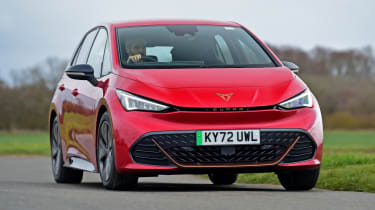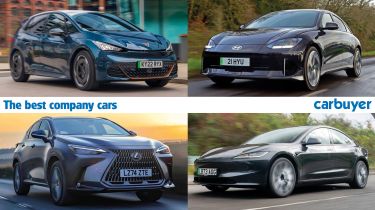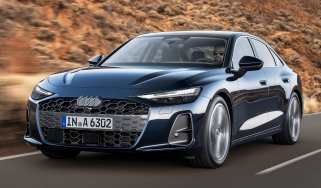Cupra Born review – a good-value and fun electric hatchback


Choosing the best company car is a bit of a balancing act. You’ll want something comfortable, practical and efficient, but it also has to make sense financially. It all hinges on the UK’s Benefit-in-Kind tax system, which is used to work out how much each company car will cost you.
 The 10 best electric cars in 2025
The 10 best electric cars in 2025
The amount of BiK tax you pay is based on two things: a car’s CO2 emissions and its list price. For that reason, electric cars often make the most sense for company car drivers – with zero CO2 emissions, the monthly tax bill is often a fraction of the cost of an equivalent petrol car. You’ll find that most of our picks on this list are EVs, but we’ve also thrown in a few hybrid models. Not everyone is ready to switch to an EV yet, but we think these hybrids make for great company cars, too.
But what else is there to think about when choosing a company car? Well, it depends on how you plan to use your car. Are you a city commuter who will benefit from an electric vehicle’s low BiK rate, or do you need the long-range convenience of a hybrid for longer business trips? Would you benefit from the interior space of an SUV, or will a small hatchback be easier to park where you live? Our car choosing checklist will help you answer those questions and decide on which type of car best suits your needs.
For now though, we’ll cover our top 10 favourite company cars on sale today. Many are Carbuyer Best Car award winners, and several feature in our lists of the best electric cars and best plug-in hybrid cars.
The Cupra Born took our overall Best Small Company Car award for the third year running at the 2025 Carbuyer Best Car awards, and for good reason. It shares many of its parts with the Volkswagen ID.3, but the Cupra offers everything its German cousin does in a much sleeker, sportier and even slightly more affordable package, feeling a little less sterile as a result.
Size-wize, the Born is comparable to a family hatchback, like the Spanish brand’s own Cupra Leon. There are two battery options to choose from; even the base model can do 240 miles on a charge, however, we recommend stepping up to the 77kWh battery and its 340-mile range if you plan to travel long distances frequently. However, no matter what distance you travel, the journey itself will be pleasurable as the Born is one of the most enjoyable EVs to drive, with performance bordering on hot hatch levels.
|
Pros |
Cons |
|
|
The Tesla Model Y was one of the best-selling cars in the UK during 2023, and its reputation as a stellar company car only helps bolster its popularity. While the Tesla Model Y has many more competitors than it did when it was first released, many are only just beginning to catch up with the electric SUV’s impressive levels of tech and equipment. A new Long Range model and the option of seven seats have further improved the recipe, so the Model Y unsurprisingly picked up our Best Large Company Car award for 2025.
As has come to be a trademark of Tesla’s entire range, you can get the Model Y with blisteringly quick performance credentials. All versions of the Model Y are pretty quick, but in Performance guise, the electric SUV will get from 0 to 62mph in a mind-boggling 3.5 seconds, which is up there with serious sports cars. Unlike a supercar, though, there’s also plenty of room for storage and boot space, with the Model Y one of the class leaders in this area.
|
Pros |
Cons |
|
|
The BMW 3 Series has historically been a company car favourite, and while it’s still a great choice, the all-electric BMW i4 makes even more sense for business users and was our Best Company Car for 2023. Essentially a battery-powered version of the 4 Series Gran Coupe, the i4 offers all of what buyers love about BMW cars such as a luxurious interior, the latest tech and a sporty drive, in a zero-emissions package.
There are two powertrains to choose from, but we think most buyers should go for the entry-level eDrive40. With a punchy 335bhp electric motor, 0-62mph takes just 5.7 seconds and thanks to a large 81kWh battery, owners should find it easy to achieve over 300 miles on a single charge.
|
Pros |
Cons |
|
|
Although the comparison has become somewhat of a cliche, the latest Mercedes C-Class has truly positioned itself as a budget alternative to the larger S-Class. Just like its limousine sibling, the C-Class has an elegant exterior design and an opulent interior. This is dominated by a huge 11.9-inch central touchscreen which utilises the brand’s slick MBUX operating system. It is available with augmented-reality navigation that superimposes directions onto the road using the car’s camera systems.
The real reason for company car drivers to consider the C-Class, however, is the excellent C 300 e, which is one of our favourite plug-in hybrids. This model offers a class-leading electric range of over 70 miles, which should be enough to cover most commutes. That helps place it in the second-lowest BiK band, keeping your monthly payments affordable. If you’re looking to travel farther, you have a 2.0-litre petrol engine for backup which will kick in automatically. The combination of its electric motor and combustion engine will return up to 565mpg according to Mercedes – a bit optimistic perhaps, but not entirely impossible if you spend most of your time driving in EV mode.
|
Pros |
Cons |
|
|
Talk about a transformation – the new Toyota Prius is a far cry from its predecessors, and not just because of its new-found style. The car that revolutionised hybrid tech is now a plug-in hybrid only, meaning you get a useful electric range of around 50 miles. That will be plenty for most commuters and makes all the difference for keeping that BiK rate low.
Admittedly, the new Prius is more expensive to buy than before, but the low emissions of the plug-in hybrid engine mean that it’s no less affordable than the old self-charging hybrid model for company car drivers. There’s a lot going for the Prius in other areas, too. With 220bhp and impressive body control through the corners, it's surprisingly fun to drive. Day to day, it’s comfortable, quiet and has a well-appointed cabin, although rear-seat space is a bit tight. Overall, we think it makes a great choice for company car drivers who aren’t ready for a fully-electric car, so it’s no surprise that it picked up our Best Plug-in Hybrid award this year.
|
Pros |
Cons |
|
|
With the Tesla Model Y finding itself near the top of this list, it’s little surprise to find the Model 3 here, too. Under the sleek saloon bodywork it’s essentially the same car as the Model Y, using the American firm’s latest battery and motor tech. There’s up to a whopping 436 miles of range on offer, making it one of the longest-range EVs on sale, while Performance models deliver some supercar-rivalling acceleration figures.
For company car drivers though, the Model 3’s refined driving experience and great cabin tech will probably be the key selling points. If you can get onboard with the minimalist layout of the interior and its single, central screen, then you’re likely to have few complaints driving the Model 3. Even the build quality has taken a step up following its mid-life refresh in 2024.
|
Pros |
Cons |
|
|
The Hyundai Ioniq 6 is a rare beast compared to cars like the Tesla Model 3 and Model Y, but we’d argue it’s a bit of a hidden gem. The quirky EV has some unusual styling, inspired by ‘streamliner’ cars of the 1930s, but we think it stands out in today’s crowd of chunky SUVs. Importantly, you get the same excellent EV hardware as the popular Hyundai Ioniq 5, meaning up to 338 miles of range is possible from its 77kWh battery.
While the Ioniq 6 might be similar in principle to the Tesla Model 3, things become quite different once you sit inside. We’re big fans of its cabin – it strikes a great balance between looking modern and providing enough physical controls, something that can’t be said about the Model 3. The Tesla does have the Hyundai beaten for rear seat and boot space, so if these are priorities for you, you’ll probably be better off with something else.
|
Pros |
Cons |
|
|
Our Large Plug-in Hybrid award winner for 2025, the Lexus NX makes a great company car for those needing lots of room. It’s available with either a self-charging hybrid system or a plug-in system, but only the latter will make sense for company car drivers. Sure, it’s more expensive to buy, but you’ll be paying far less each month thanks to its low BiK rate of 8%. You also get 40 miles of electric range and 302bhp to play with, making the NX both convenient and quick.
As we’ve come to expect from the premium Japanese brand, the Lexus NX is hugely refined. The engine and electric motors work together seamlessly, so it’s just as happy silently creeping around town as it is cruising on the motorway. Interior quality is a real highlight, as it always has been for Lexus, and the touchscreen infotainment system is far easier to use than the old trackpad setup. The big boot and spacious rear seats mean the NX will happily tackle family duties, making it our big car pick for company car drivers who don’t fancy an EV.
|
Pros |
Cons |
|
|
The MG4 has quickly become one of our favourite electric cars thanks to the exceptional value for money it offers. For the same price as the equivalent petrol-powered family hatchback, the MG4 is a roomier, fully electric model with lots of standard equipment, including a 10.25-inch touchscreen and a full suite of driver aids and safety features.
MGs of late have been rather uninspiring to drive, however the ‘4’ bucks this trend with its sharp steering and sporty rear-wheel-drive layout. Entry-level models offer a decent range of over 200 miles, so should be suitable for those just looking to spend most of their time driving around town. The Long Range variant increases this figure to around 280 miles, but it’s worth remembering all MG4s come as standard with 150kW ultra-rapid charging capability for quick top-ups at compatible public charging stations.
|
Pros |
Cons |
|
|
Swedish car maker Polestar burst onto the EV scene in 2017, and it has since become one of Tesla’s key rivals. The Polestar 2 was its first model aimed at families, and it remains the mainstay of its lineup – plus, it’s an excellent choice for company car drivers. Like the other EVs on this list, it benefits from an ultra-low BiK bill, although it is slightly more expensive than the Tesla Model 3. It can’t match the Model 3’s range either, but up to 408 miles is still nothing to be sniffed at.
Once you sit in the Polestar 2’s driving seat, you can see where your extra cash has been spent. It feels like an altogether more premium product than the Model 3, with plush materials and a more interesting design. The infotainment system is up there with the best, running Google-based software that’s quick and intuitive. The hatchback bootlid makes it a practical machine, too, although the rear seats aren’t particularly spacious. If there’s an area of weakness, it’s ride quality – we found the 2 to be quite harsh on British roads, so make sure to try before you buy.
|
Pros |
Cons |
|
|
Half of all new cars registered in the UK are purchased for company car fleets but what should you look for when it comes to choosing one? When picking a company car, you'll want to keep a close eye on costs, with a car's Benefit-in-Kind (BiK) liability the biggest deciding factor.
For decades the diesel engine was the default choice of the company-car driver, thanks to their prodigious efficiency. Now, however, the incentive is to get people behind the wheel of EVs, so fossil fuel-powered cars face much higher BiK bills. Until April 2025, business users of electric cars pay just 2% BiK tax. By comparison, a former company-car favourite, the Skoda Superb, now attracts a BiK rate of 30-35% when specced with a 2.0-litre TDI diesel engine, depending on specification. So, although alternative fuel models may come with a larger price tag, they’ll typically end up saving you money in the long term.
Want to find out whether hybrid, plug-in hybrid or electric power is better suited to you? Click here to read our hybrid vs plug-in hybrid vs electric cars guide



